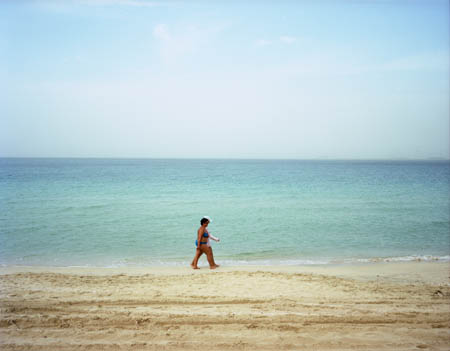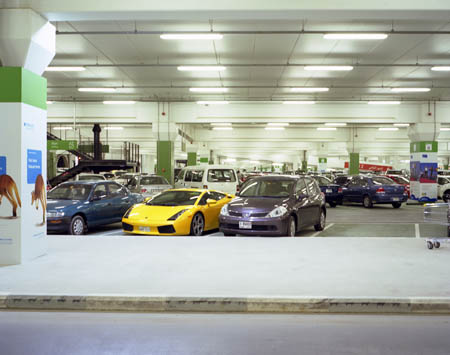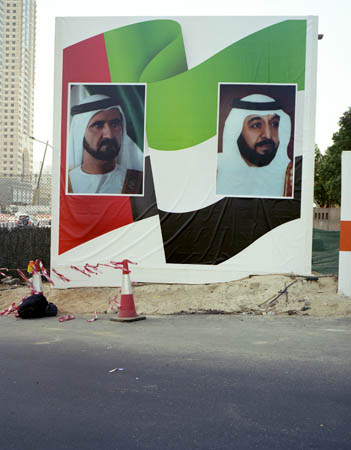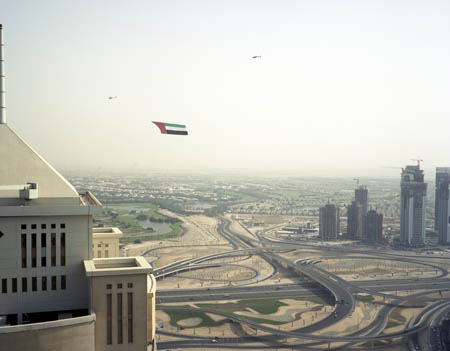Escape from Dubai
Things are changing rapidly in Dubai...a former home of mine and a city I travel to frequently to write about the arts and culture scene. In this article for Abitare, I analyze how the city is adapting to the 2008 financial crisis.
The caramel colored sand surrounding Dubai seemed a blank canvas only a short while ago. It was just a matter of time, we mused, till the cranes would venture to these pristine mounds and transform them into the next big multi-billion dollar multiplex. Prudence was a word hardly uttered in the mushrooming city’s marble laden malls or glittery five-star hotels.
Yet after a recent trip to the young Gulf town, it became clear the tides had somewhat changed. Traffic had thinned out, and the notoriously impetuous cranes seemed to move in a more calculated and deliberate manner. The era of unflinching development had, if only for a moment, paused.
Scabs of articles pronounced the “Death of Dubai” at the same time the country’s richer and less ostentatious brother, Abu Dhabi, loaned the Emirate $15 billion in an effort to stave off bankruptcy. Media rumor mills churned out stories of cockroaches streaming through water taps on the Palm Island archipelago, and even hundreds of abandoned cars, keys still in the ignition, collecting dust at the city’s airport.

Although I have yet to see any of the above, there is no denying that the seemingly easy to achieve expatriate dream of year round sunshine and tax-free living has been momentarily tarnished. Thousands have fled, and according to many experts in the city, more are headed for departure. The reasons are abound, but most are a result of easy labor and immigration laws that stipulate little repercussions for corporate cuts. Best-case scenario, experts report, Dubai’s population shrinks by 10%; worst case, a fifth in the course of two years.

This spells big problems for a city with one of the world’s largest expatriate populations – according to the Swiss bank, UBS, only a tenth of this city is local. The effects are likely to ripple in all sectors as the numbers decline. In real estate alone, prices have dropped a staggering 41% percent in the first few months of this year. The downward spiral has already set the scene for reneging projects worth billions of dollars. The more they’re slashed, the more workers will leave.
According to the Dubai Ministry of Interior Naturalization & Residency, the city has already cancelled 54,684 residency visas in January, which comes out to around 1,764 every day – up 89% from just one year ago. “Unless the government changes its residency policies to allow a longer grace period in between jobs, there will be downward pressure on Dubai’s population,” says a professor of entrepreneurship at a local business school.
For now, Dubai employment laws allow just one month for visa holders to find a job or you’re forced to leave. “In the US, unemployment is expected to reach 10-15%. Similar levels of job losses will occur in Dubai. Many of those people have families here. And many guest-workers will be sent home if construction projects stay on hold.”

Mid-March saw Dubai’s police chief, Lieutenant General Dhani Khalifan al-Tamim, asking for ease in regulations on check fraud because, as he put it, the banks “lent too easily” and now his jails were filling up fast with people who were bouncing checks.
In Dubai, those who fail to pay are viewed as criminals. When the General made his plea, prison officials announced 20% of the city’s 2,400 inmates were there for check fraud. Yet many of the locals here, or even those who are not Emirati passport holders but grew up in the city, see the shifting demographics as essentially positive. If anything, explains Ahmed and Rashid bin Shabib, twin Emirati brothers considered one of the city’s brightest entrepreneurs, Dubai is ridding itself of those they deem have little respect for the Emirate and its longevity.

The two suggest the shifting dynamics mean more momentum for homegrown movements. Until now, they explain, Dubai locals were expected to take up jobs in the corporate world, “because,” says Rashid, “that was where the respect was.” Now, amidst a corporate shakedown, it seems the entrepreneurial spirit the Shabib brothers embody is not only embraced, but also eagerly cultivated.
“We have been very good at breaking the system,” says Rashid Shabib, “and creating our own. We are trying to develop a new movement in culture and social creation.” Their latest development, after establishing a publishing house that produces the monthly Brownbook Magazine, was taking over a warehouse and turning it into a place for creative types to rent office space.
Compared to most office buildings in the city, rents at Shelter are cheap, which makes it easy for those without corporate sponsorship to set up and work in Dubai. Rashid sees the slowdown brought on by the recession as a positive turn of events for his hometown. “One of the things that happened in Dubai was we were running in such at a fast pace. At some point, we forgot why we were running and moving. This will give us breathing space and let us understand where we are heading before we take the next step.”
Just as the crisis washed ashore, Dubai recognized its reputation as a city with little to no content creation was no longer sustainable. The realization prompted the formation of the Dubai Culture and Arts Authority. Less then a year old, the Authority is not only managing the execution of new museums, but also tackling how the city can become known as one that facilitates all kinds of creative endeavors. At the helm of their agenda is building affordable housing, creating part time employment and grant structures. Seems simple enough, yet Dubai has been structured in such a way that those seeking to hone their artistic skills cannot afford the city’s bloated rents, or even obtain visas that allow them anything except full time employment opportunities.
Grooming local talent has also gained momentum in the retail fashion sector – one of Dubai’s chief tourist attractions.
Although brand conscious shoppers remain the driving source of revenue, the successful decision made by the owners of the S*uce Boutique to hang the work of unknown regional talents amidst frocks from the internationally renowned proved a craving for wearing native designs exists. The rising figures of loyal consumers encouraged the owners to unveil the S*uce Incubator, a project that picks up and cultivates not only Emirati designers, but also regional ones longing to penetrate the international market with the store as their managers.
Propelling local furniture design into the limelight is Dubai-native Rami Farook. He opened Traffic, the region’s only contemporary design gallery and store, not only as a stage for big name designers, but also for Middle East-based unknowns striving to gain attention both here and in the West. Traffic’s annual design competitions have underscored Farook’s initial conviction that the know-how not only exists here, but can also stand tall amid Dubai’s disproportionate amount of imported items. Farook’s conviction was put to the test this year, after launching Traffic’s manufacturing division. It was under this new entity he presented the city’s first series of locally designed furniture, which he will exhibit in Milan Furniture Fair next year.
Perhaps just in time for the expatriate exodus, the 93,000-sqm Entrepreneur Business Village has just opened. Inside the pastel colored towers – billed as an incubator for young local talent – are endless hallways of office space primed for this city’s youngest and brightest. Dale D. Murphy, a senior research fellow at the Dubai School of Government, sees the behemoth structure as a step in the right direction. “There is often a synergy that comes out of the recession,” says Murphy. “You are liberated from your daily habits and all gets challenged. You are forced in to a new endeavor that inevitably builds bridges in thinking and practice.”
Murphy’s apartment has views of the block-long, multi-colored Entrepreneur Village. “Easy money,” he adds, “makes for bad habits of entrepreneurs.”